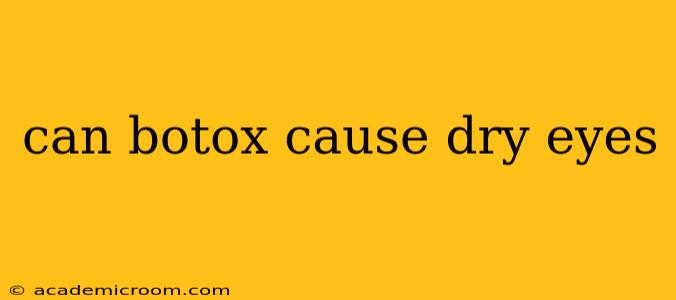Botox, a popular cosmetic treatment, is known for its ability to temporarily reduce wrinkles and fine lines. However, some individuals report experiencing dry eyes after receiving Botox injections. This article explores the potential connection between Botox and dry eyes, examining the causes, symptoms, and management strategies.
How Can Botox Injections Lead to Dry Eyes?
While not a common side effect, dry eyes can occur after Botox injections, particularly around the eye area. This is primarily because the botulinum toxin, the active ingredient in Botox, affects muscles controlling tear production and eyelid movement. Here's a breakdown:
- Impact on Tear Glands: Botox injections near the tear glands can inadvertently interfere with their function, reducing the amount of tears produced. This reduced tear production is a hallmark of dry eye syndrome.
- Impaired Eyelid Closure: Botox can affect the muscles responsible for proper eyelid closure. Incomplete closure (lagophthalmos) exposes the cornea to the environment, leading to increased evaporation and dryness.
- Reduced Blink Rate: The frequency of blinking is crucial for maintaining eye lubrication. Botox can subtly alter blinking patterns, potentially leading to less frequent blinking and subsequent dryness.
It's crucial to remember that the likelihood of experiencing dry eyes from Botox is relatively low. The severity and duration of dryness also vary significantly between individuals.
What are the Symptoms of Dry Eyes After Botox?
The symptoms of dry eyes following Botox injections are similar to those of general dry eye syndrome. These can include:
- Burning or stinging sensation: A common complaint, often intensified by prolonged screen time or exposure to wind.
- Itching: A feeling of irritation or discomfort in the eyes.
- Excessive tearing: Ironically, dry eyes can sometimes lead to excessive tearing as the eyes attempt to compensate for lack of lubrication.
- Blurry vision: Dryness can affect the clarity of vision.
- Gritty sensation: A feeling of something foreign in the eye.
- Eye fatigue: Dry eyes can quickly lead to eye strain and fatigue.
How Long Do Dry Eyes Last After Botox?
The duration of dry eyes after Botox injections is variable and depends on several factors including the injection site, the amount of Botox administered, and individual sensitivity. In most cases, the dryness resolves itself within a few weeks as the effects of the Botox wear off. However, in some instances, it may persist for longer.
What Can I Do If Botox Causes Dry Eyes?
If you experience dry eyes after Botox, several management strategies can help alleviate symptoms:
- Artificial Tears: Over-the-counter artificial tears provide temporary relief by lubricating the eyes. Using these regularly, as advised by your doctor, can significantly improve comfort.
- Warm Compresses: Applying warm compresses to the eyelids can help stimulate tear production and relieve dryness.
- Eyelid Hygiene: Keeping the eyelids clean can prevent the formation of blockages in the tear ducts. Gentle eyelid cleansing with a warm compress can be helpful.
- Prescription Eye Drops: In cases of persistent or severe dry eyes, your ophthalmologist may prescribe stronger eye drops, such as cyclosporine, to reduce inflammation and enhance tear production.
- Consult Your Doctor: It's vital to contact your doctor or the clinic where you received the Botox if you experience any concerning side effects, including persistent dry eyes. They can assess the situation and provide appropriate recommendations.
Is it Possible to Prevent Botox-Induced Dry Eyes?
While there's no foolproof way to prevent Botox from causing dry eyes, choosing an experienced and skilled injector can significantly reduce the risk. A qualified practitioner is more likely to avoid injecting near the tear glands and will carefully consider the injection technique to minimize the risk of complications. Furthermore, open communication with your injector regarding any pre-existing eye conditions is crucial before the procedure.
Can Certain Botox Types Cause More Dry Eyes Than Others?
Currently, there's no conclusive evidence suggesting that certain types of Botox are more likely to cause dry eyes than others. The risk is more closely tied to the injection technique and individual anatomical variations rather than the specific Botox formulation.
This information is for general knowledge and does not constitute medical advice. Always consult with a qualified healthcare professional for any health concerns or before making any decisions related to your health or treatment.
